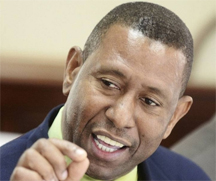(Jamaica Gleaner) A former senior prosecutor who has served across the Caribbean is asserting that judges in Jamaica and the rest of the region are not capable of delivering judgments that are on par with their British counterparts.

Consequently, Jamaican attorney Hugh Wildman, who made the assertion yesterday, urged regional governments to tread cautiously in their move to replace the United Kingdom-based Privy Council with the Caribbean Court of Justice (CCJ).
“I am not confident or comfortable that we are going to replace the Privy Council with a court of equal standing in terms of erudition,” Wildman told a Gleaner Editors’ Forum held at the newspaper’s offices in central Kingston.
But Wildman, the former director of public prosecutions in Grenada and deputy DPP in Jamaica, did not stop there with his comments that surprised Attorney General Patrick Atkinson and other prominent attorneys at the forum.
“It is my considered view that the quality of the judgments given by the Privy Council are far superior to what we are seeing in the region and for that matter what we are seeing coming out of the CCJ,” he continued.
“As it stands now, when one looks at the quality of the judgments coming out of the region, including Jamaica, I cannot say if we were to replace the Privy Council (with the CCJ) that we would be attaining that level of competency,” he added.

Currently, Jamaica has established the CCJ in its original jurisdiction, to deal with trade matters, and the Government has placed legislation before Parliament to have the court established in its appellate jurisdiction.
To bolster his argument, Wildman pointed to a study he claimed was done by a reputable international law firm which showed that the Privy Council has overturned 62 per cent of the appeals that came from Jamaica.
“Having practised in other jurisdictions in the Caribbean, I am even more fortified in saying that I don’t think that we have reached the level that we should now go and abolish the Privy Council at this time,” Wildman said.
But in a swift response, Atkinson defended Jamaican jurists, declaring the country’s standard of justice matches favourably “with any one of them”.
“I reject completely any suggestion that the decisions coming out of our courts are inferior to decisions coming out of the English courts,” he stressed.
“I absolutely reject it. I think it is unfair, I think it is untrue and I don’t think it is based on any kind of statistics or careful study,” insisted Atkinson. Opposition Spokesman on National Security and Justice Delroy Chuck also distanced himself from Wildman’s comments.
“I don’t agree with my friend Hugh Wildman that we don’t have persons of intellectual brilliance … and indeed some of the judgments out of the Caribbean Court of Justice are quite good judgments,” Chuck said.
Former Public Defender Howard Hamilton also sided with Chuck and Atkinson.
Way below standard But Wildman stuck to his argument, citing a recent case in Guyana.
“It was generally considered that that judgment was way below standard and we can’t accept that as representing the standard that should be accepted in the region in so far as commercial matters are concerned,” Wildman said.
Chuck agreed that the ruling in that case was “poor”, but said “the fact that a poor judgment was delivered (doesn’t mean) everything is bad”. Wildman urged regional governments to be careful they were not trying to replace the Privy Council “just for the notion of decolonisation”.
“(Just) to say that we have replaced the Queen. What is important is that at the end of the day, the people would want to know that if you are going to replace the Privy Council, you are going to replace it with a court that is on equal standing or close to being equal, not an inferior court,” he continued.
He pointed to the decision by the government of Trinidad and Tobago to retain the Privy Council as the final appellate court in criminal matters as a sign that “they are not comfortable with the CCJ as the final court” in those cases.
